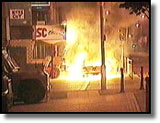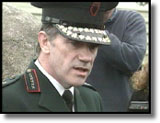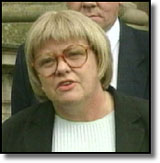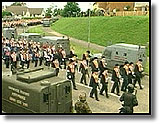
|
Violence Follows Drumcree MarchBBC Reporter Ben Geoghegan reports on the night's violence There was violence in nationalist areas across Northern Ireland overnight following a Protestant march through a mainly Catholic area of Portadown, County Armagh. Police and troops clashed with crowds of angry youths in Portadown, Newry, Belfast and Londonderry. A 14-year-old boy is seriously ill in hospital after being hit in the head by a plastic bullet fired by the security forces in West Belfast. Also in Belfast, another boy the same age was wounded in the shoulder when a gunman opened fire on police, according to an RUC spokesman. New Barnsley police station in the city was shaken by a bomb. Officers there exchanged fire with a gunman who aimed a number of shots at the station. In south Belfast, another unidentified gunman fired five shots at police on a bridge that divides Catholic and predominantly Protestant areas; nobody was injured. The Republican terrorist group the Irish National Liberation Army said in a call to the BBC that it was behind attacks on police and troops.
A policewoman was wounded in the face in Coalisland, 15 miles northwest of Belfast, when a man wielding a shotgun ran out of a pub and shot at her. Her wounds are said to be not life-threatening. The IRA said later that they had attacked her. In Londonderry, large crowds took to the streets in its staunchly-nationalist areas. Vehicles were hijacked and set alight and makeshift barriers were put up on the Bogside. Hundreds of petrol bombs were thrown at security forces, who responded with plastic bullets. Police said at a news conference in Londonderry during the night said that the unrest was being orchestrated.
Call for Street Action"The turnout in the Six Counties over the next couple of weeks will show the nationalist community is determined to get justice and peace for the people of Ireland." Reacting to the events, nationalist politicians condemned the police decision to push through the march; Unionists complained that the subsequent violence had been pre-planned. The Northern Ireland Secretary called on both sides to resolve other disputes in the days ahead. Of the marches that are planned, potentially the most controversial is that on the Ormeau Road in Belfast, due to take place on Saturday.
Police said the decision had been taken to prevent Protestant rioting. Last year Loyalist militants blocked roads, burnt cars and harassed Catholic families when police initially blocked the Drumcree march. The RUC Chief Constable, Ronnie Flannagan, had announced his decision to let the march go ahead early on Sunday morning. "The choice I was left with was a simple, stark choice in terms of balancing two evils," he said. "Each evil threatened to bring about serious violence. I'm talking about loss of life." He apologised to residents of Garvaghy Road for the fact that the parade had to go ahead and said conditions had been imposed to make sure it would pass quietly. "I want to subject them to minimum violence," he said.
Government Support For March Decision
On the steps of Stormont Castle in Belfast, Ms Mowlam told a news conference: "Northern Ireland has seen far too many tragedies. Peace and the preservation of life in the end matters most of all." The right to peaceful assembly, the right to march, was a basic right. But she said all rights carried responsibilities and should be, "exercised with respect for the rights and freedoms of others." Ms Mowlam said the decision by the RUC chief constable to allow the Drumcree march to go ahead had been taken to preserve public safety. BBC correspondents in Northern Ireland say the response, primarily in working class nationalist districts, was almost inevitable, and that it is difficult to see what can now be salvaged of the peace process.
The Drumcree March
Peter Hunt reports from Drumcree -- Dur: 1:58 Nationalist residents, held back by police and troops, hurled abuse and banged dustbin lids as the parade passed between lines of vehicles belonging to the security forces. Bottles were thrown but the Orangemen marched in silence, and the parade itself passed off peacefully.
|
Diana, Princess of Wales, 1961-1997
Conference 97
Devolution
The Archive
News |
Issues |
Background |
Parties |
Analysis |
TV/Radio/Web
Interactive |
Forum |
Live |
About This Site
News |
Issues |
Background |
Parties |
Analysis |
TV/Radio/Web
Interactive |
Forum |
Live |
About This Site
© BBC 1997 |
politics97@bbc.co.uk |





